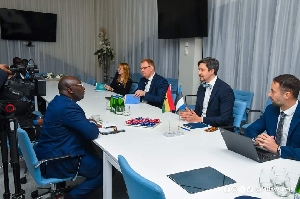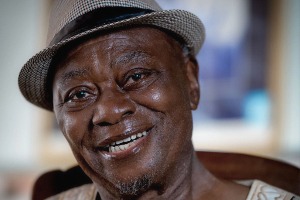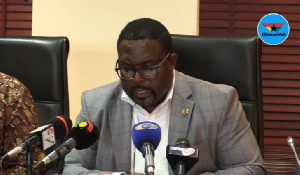The Vice President, Dr. Mahaumdu Bawumia, has been on a working visit to Estonia this week with a Ghanaian delegation, to hold talks with authorities there on the two countries' digitalisation journey, framework and impact.
While Ghana has made remarkable strides in the past seven years in digitising the Ghanaian society, Estonia is a global giant in the area, as they are widely regarded as the most digitally advanced country in the world.
During one of the meetings with Dr. Bawumia in the Estonian capital, Tallinn, officials of e-Estonia Academy, one of Estonia's national digitalisation agencies, revealed how the decision to digitise the nation and public services, have gotten rid of corruption, which they Saif, was endemic before the advent of digitalisation some 20 years ago, after independence.
"We inherited a very corrupt public system and there was the urgent need for us to do something," said a senior official of e-Estonia.
"Digitalisation has really helped us to sanitise the system and weed out corruption. As one of our former leaders used to say, "You cannot bribe a computer."
Apart from removing the human interface in public service delivery, digitising Estonia has also helped the country to maintain efficient revenue generation through a transparent tax system, where people and businesses easily file their tax returns online from the comfort of their homes.
CORRUPTION FIGHT IN LINE WITH DR. BAWUMIA'S VISION
Estonia's success story in fighting corruption through digitisation is in line with Dr. Bawumia's quest to ensure the same happens in Ghana.
Dr. Bawumia maintains that by digitising many public services such as the application and renewal of driver licenses, passports, NHIS registration, and port clearance, among many others in Ghana, human contacts have been reduced significantly, and corruption will be dealt a fatal blow once all these services fully integrate their database with the Ghanacard database, which would not require holders of Ghanacard to physically show up at other offices or agencies, to access service.
Even at this growing stage of Ghana's digitalisation process, Dr. Bawumia maintains, with verifiable data at the DVLA, Passport office and the ports, which show a considerable leap in revenue generation under online service, against meagre revenues generated before digitalisation.
For instance, in 2016, before the application of passports went online, the passport office processed a total of 16,232 applications with a revenue of GHC1.1m.
Following the introduction of online application, the same passport office, in 2021, received and processed 498,963 online passport applications with a total revenue of GHC56.7m.
Data at other service providers also show a significant increase in revenue, which, hitherto, would have ended up in private pockets.
At one of his meetings with the Estonian authorities, Vice President Bawumia reiterated his commitment and confidence in using technology to fight corruption in Ghana.
"As you have rightly said, a computer cannot be bribed and that is where we are going. Digitalisation is an effective tool to fight corruption. You put in place an effective system, which automatically fights corruption. That is the goal and we are on track."
Dr. Bawumia's delegation includes the Minister of State at the Ministry of Finance, Mohammed Amin Adam, as well as representatives from the Ghana Revenue Authority, Volta River Authority, National Information and Technology Agency and the private sector IT and Fintech companies.
General News of Saturday, 27 January 2024
Source: www.ghanaweb.com

















